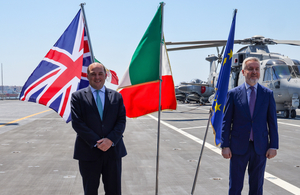Defence Secretary meets with NATO Allies on board HMS Queen Elizabeth as Carrier Strike Group visits Italy
Defence Secretary Ben Wallace has met with counterparts from Italy and Turkey on board HMS Queen Elizabeth during his first visit to the Carrier Strike Group since its departure from Portsmouth in May.

Defence Secretary Ben Wallace (l) with Italian Defence Minister Lorenzo Guerini (r)
The historic deployment continues to provide the perfect platform for the UK to forge ever-closer relationships with defence partners, after Defence Secretary Ben Wallace met with Italian Defence Minister Lorenzo Guerini and Turkish Defence Minister Hulusi Akar on board the UK’s flagship as it docked in Augusta, Sicily.
Ahead of next week’s NATO Summit in Brussels, the visit provided the Defence Secretary with the opportunity to discuss with two fellow Alliance members how our three nations can work together both directly and as part of NATO to tackle global threats and uphold regional security in the Mediterranean.
Mr Wallace updated his counterparts on the recently published Integrated Review into security, defence, foreign and development policy and the accompanying Defence Command Paper which cites the cast-iron commitment the UK has to the NATO Alliance.
He also reiterated the forward-leaning and collaborative role the UK will play with partners when it comes to tackling shared challenges such as securing peace in Libya. Instability in Libya in recent years has allowed Daesh to capture territory while people smugglers use the country as a staging post to send migrants on the dangerous journey across the Mediterranean into Europe.
The three NATO defence ministers also discussed how they could work together to help Libya achieve lasting security, stability and peace. The Defence Secretary’s visit was then completed with a head-to-head meeting with Turkish Defence Minister Hulusi Akar on recent defence collaboration, including Carrier Strike Group escort vessel HMS Defender’s visit to Istanbul earlier this week.
Their discussions came after Mr Wallace had spent a day in Libya alongside Foreign Minister James Cleverley meeting with the Prime Minister Abdulhamid Dabaiba and other Libyan officials to discuss UK support for their nation as they move forward with the peace process and elections planned for later this year.
Defence Secretary Ben Wallace said:
It was a fantastic opportunity to see my counterparts Lorenzo Guerini and Hulusi Akar on board the ITS Cavour and the UK’s own aircraft carrier HMS Queen Elizabeth today. We share both a commitment to the security of the Mediterranean and building the capabilities required to act, as shown by our recent exercises as part of the CSG deployment.
Before joining Mr Akar on board HMS Queen Elizabeth, Mr Wallace and Mr Guerini discussed UK-Italian defence cooperation on board Italian Navy carrier ITS Cavour.
As close NATO Allies, the UK and Italy share a commitment to democratic values and a focus on innovation and the importance of new technology to maintain an edge over those who would threaten those values – both nations are the only two European NATO members that operate the latest cutting-edge F35B jets from an aircraft carrier. Earlier this week, F-35 Lightning jets from Italy and Israel joined those from the US and UK deployed on the Carrier Strike Group for training in Exercise Falcon Strike. Italian Navy carrier ITS Cavour sailed to Augusta from its home port in Taranto to support the meetings, after destroyer ITS Andrea Doria had integrated with CSG over the previous 10 days.
Elsewhere across Italy, ships from Carrier Strike Group conducted port visits and local engagements with HMS Diamond in Taranto, RFA Fort Victoria in Messina and USS The Sullivans in Gaeta. With warships from Britain, the United States, the Netherlands and now Italy, the UK Carrier Strike group is a truly multinational force.
The Carrier Strike Group deployment sees HMS Queen Elizabeth lead six Royal Navy ships, a Royal Navy submarine, a US Navy destroyer and a frigate from the Netherlands in the largest concentration of maritime and air power to leave the UK in a generation.
The seven-month global deployment will extend through the Mediterranean and Indian Ocean and on to the Indo-Pacific, interacting with more than one fifth of the world’s nations.
It comes after the Prime Minister announced in November an increase in Defence funding of over £24-billion across the next four years, enabling our Armed Forces to adapt to meet future threats.